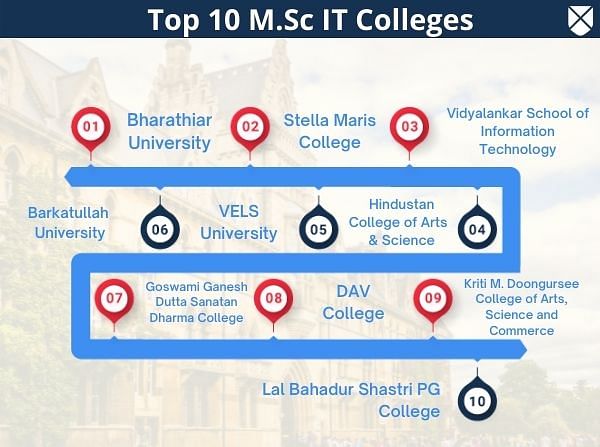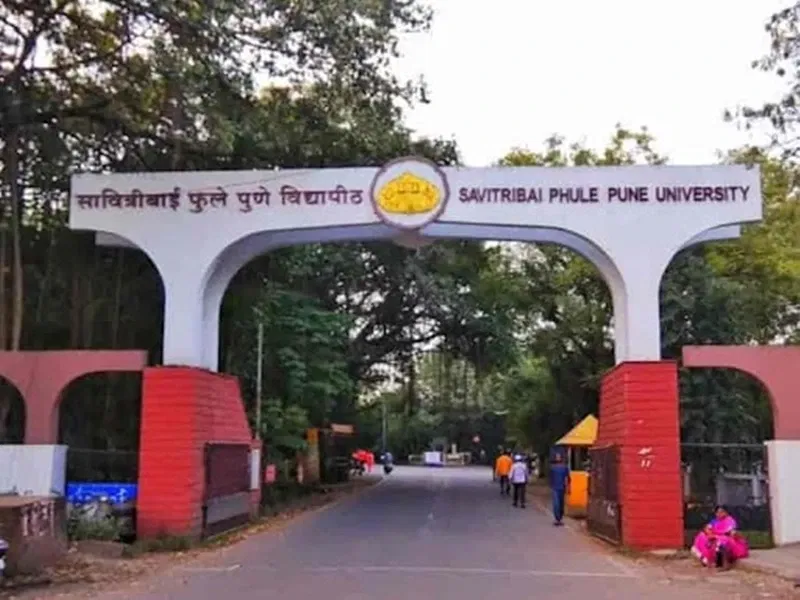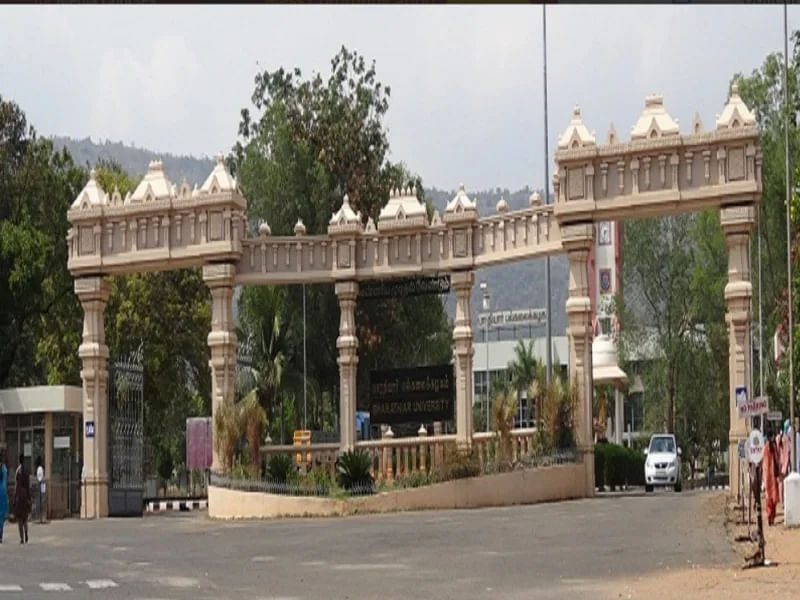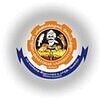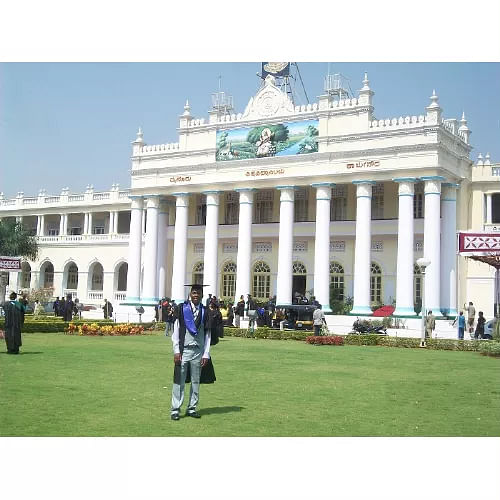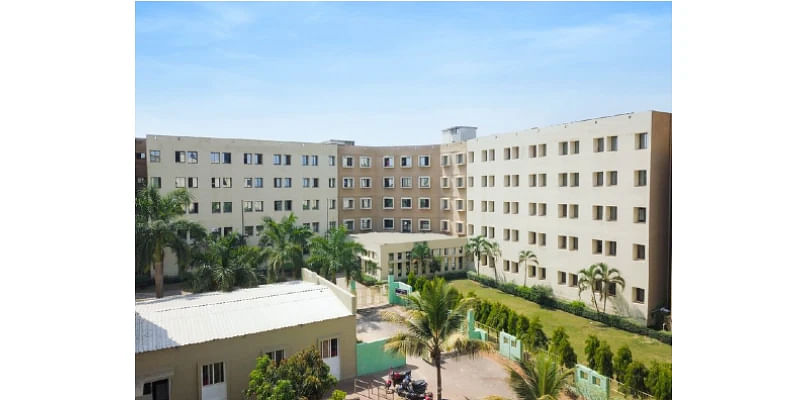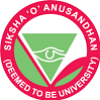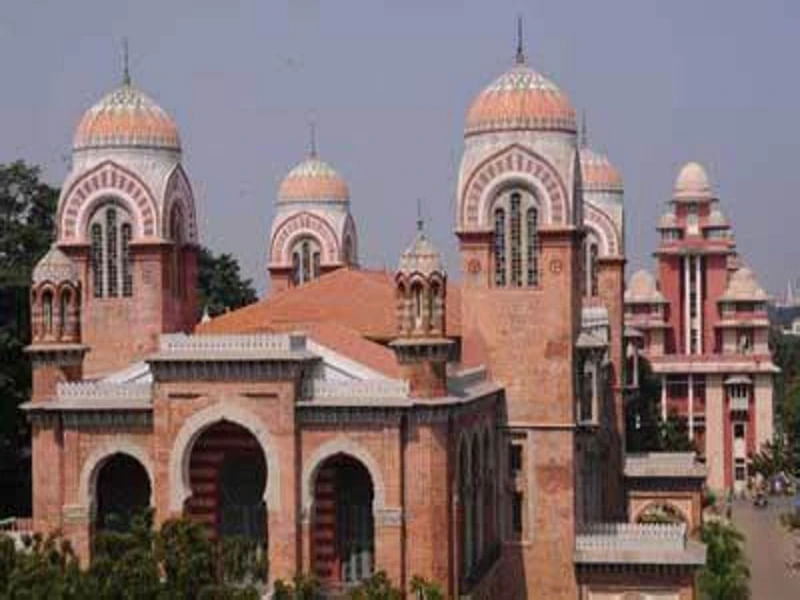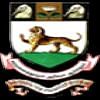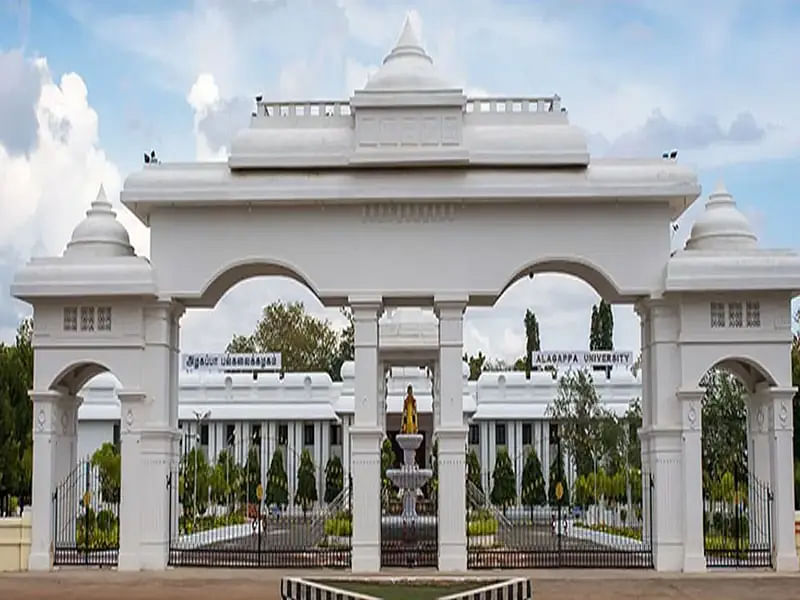M.Sc IT: Course Details, Eligibility, Admission, Fees

M.Sc Information Technology is a postgraduate course with a course duration of 2 years which deals with different aspects of information technology, artificial intelligence, data science and more. There are several job opportunities after M.Sc Information Technology course such as programmer, analyst, data scientist, developer and more
Table of Contents
- About M.Sc IT
- M.Sc IT Eligibility
- M.Sc IT Admission
- Who Should Pursue an MSc in IT?
- Types of MSc IT
- M.Sc IT Entrance Exams
- Top M.Sc IT Colleges In India
- M.Sc IT Course Fees
- M.Sc IT College Comparison
- M.Sc IT Course Comparison
- M.Sc IT Syllabus And Subjects
- Why Choose M.Sc IT?
- M.Sc IT Preparation Tips
- Scope After M.Sc IT
- Career Options For M.Sc IT
- M.Sc IT Salary
- Skills That Make You Best M.Sc IT
M.Sc Information Technology Course Details
| Degree | Masters |
| Full Form | Master of Science in Information Technology |
| Duration | 2 Years |
| Age | No age limit |
| Minimum Percentage | 50% |
| Average Fees | ₹30K - 1 LPA |
| Similar Options of Study | M.Sc (Computer Science), M.Sc (Biotechnology), M.Sc (Physics), M.Sc (Chemistry), M.Sc (Mathematics) |
| Average Salary | INR 7.32 LPA |
| Employment Roles | Software Engineer, Senior Software Engineer, Software Developer, Project Manager, Sr. Software Engineer/Developer/Programmer, Software Test Lead, Project Manager, Software Development |
About M.Sc IT
The full form of M.Sc IT is Master of Science in Information Technology.The aim of the course is to provide both academic and practical expertise through M.Sc Information Technology subjects like computer systems, analytics, data mining, software development, etc. M.Sc Information Technology job scope is vast with employment opportunities in sectors such as research,education, healthcare, e-commerce, information technology, etc.
M.Sc IT Eligibility
M.Sc IT is a specialised program for IT professionals and graduates who are willing to upgrade their skills in the field of computer science and Information technology. M.Sc IT eligibility criteria are to have a bachelor’s degree in either computer science or information technology.
Bachelor’s degrees include Bcs, BCA, B.Tech and B.E., with an aggregate score of 50%. In addition, aspirants are expected to appear for an entrance exam and obtain a minimum cutoff score for admission to M.Sc IT program in a few colleges and universities.
M.Sc IT Admission
M.Sc IT admission is mainly based on the performance in the previous degree and in some colleges additionally, on the basis of the cutoff score obtained in the entrance exam. In some universities in the country, M.Sc IT admission is made after a round of personal interviews. Also, there are a few colleges that allow lateral entries for the M.Sc IT program.
Different colleges and universities have different M.Sc IT admission criteria hence, it is always advisable to go through the brochure or visit the official website of the desired college to satisfy their eligibility requirements.
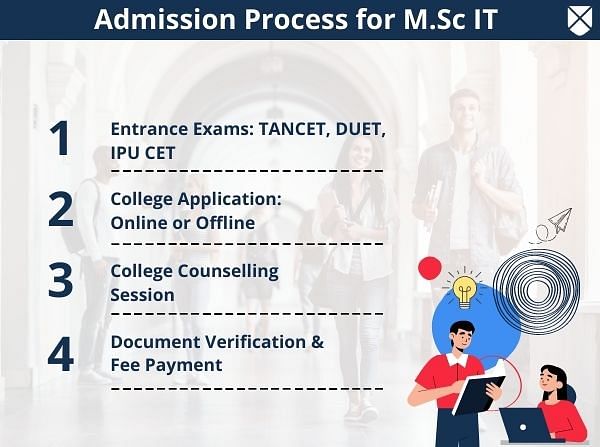
The M.Sc course admission does not differ according to the specialisation that the students choose to pursue.
Apply For The Course
Colleges offering M.Sc IT admission based on the entrance exam, require candidates to apply for the course online through the official website. The aspirants are expected to download the M.Sc IT application form and submit the duly filled application form with a photograph, signature and attachment of required documents on or before the deadline.
Along with the submission of the application form they are required to pay an application fee for successful completion of the application procedure.
Merit-Based Admission Process
Merit-based admission is a method of gaining admission to a college or university based on a student's 10+2 exam scores, graduation percentage or entrance exam scores whichever are considered the eligibility criteria for admission. You just need to meet their specific eligibility requirements, then apply online, and then be screened based on your percentage score.
In the MSc IT course the process of merit-based admission is as follows:
- Candidates can get direct admission to universities like Barkatullah University based on their graduation grades.
- In the merit-based admission process, it is essential that the students visit the online portal through which the notification was released to get important updates regarding the further process.
- Generally, merit-based admission seats are dependent on the availability of seats but sometimes a specific number of seats are kept vacant separately for this process.
- After the merit list is declared, it is required that the candidates go through the process of counselling and document verification for securing admission to the course.
- Completing the above steps successfully will secure admission to the course for a candidate.
Entrance Based Admission Process
Entrance-based admissions are based on the scores of candidates in the entrance exam along with the other eligibility criteria. The application process for admission is online through the official website of the university that one is applying to. Entrance based admission depends on the test scores of the various entrance exams that are conducted at the national as well as state levels.
The entrance-based admission process for MSC IT is given below:
- Admission to institutions like Stella Maris College and Anna University is based on an entrance examination.
- The aspirants must apply to the various exams by visiting the official websites of the conducting body.
- After the last date for the application is over, the exam bodies will publish the admit cards of the exam through email or on the official website.
- Candidates who clear the minimum cut-off depending on the exam, college, or university applied to will be eligible to secure admission to the course.
Candidates should follow the processes outlined below to apply to MSc IT institutes:
- Step 1: Go to the university's official admissions portal and register using a valid phone number and email address.
- Step 2: Carefully read the instructions and complete the application form.
- Step 3: Scan your photo, signature, and any relevant papers and upload them.
- Step 4- Verify that the application form is complete and that the uploaded documents, photo, and signature are legible.
- Step 5: To conclude the application procedure, submit the application form and deposit the application fee.
M.Sc IT Selection
Different colleges and universities have different M.Sc IT selection processes, colleges offering admission based on the undergraduate score offer admission based on the seat availability and counselling. Colleges offering admission based on the previous degree score and entrance exam cutoff, require applicants to appear for a round of personal interviews and counselling.
Who Should Pursue an MSc in IT?
Students who are interested in information technology and want to learn more about how the IT sector works are good candidates for this course. This course covers programming, database management, project management, object-oriented programming (OOP), and operating systems, among other topics.
Students will learn to tackle a variety of problems using computer programming and application design in this course.
When To Do MSc IT?
MSc IT aspirants should often apply for the degree shortly after graduating from college or with 1-2 years of experience in the IT sector. Students from primarily science backgrounds are eligible to enrol for an MSc IT programme.
Types of MSc IT
This course is for those who wish to learn more about the subject of information technology. This programme is available in three formats: full-time MSc IT, part-time MSc IT, and distance MSc IT.
Full-Time MSc IT
Students must attend classes, submit work, and take examinations on campus during their full-time MSC IT programme, which lasts two years depending on the university. Students will receive a lot more exposure, experience, and knowledge via direct engagement with their classmates and teachers in a full-time MSc IT programme.
Part-Time MSc IT
Many Indian colleges offer part-time MSc IT programmes. To be admitted to this course, students must fulfil the eligibility requirements. The curriculum might take up to three years to complete on average.
MSc IT Distance Education
The MSc IT course is also offered as a distance education course in India. Many universities across India offer MSc IT as a distance learning course. The process for getting admission to an M.Sc IT distance learning course is:
- The candidate must fulfil the minimum eligibility criteria as per the college.
- Admission is granted on the basis of the marks obtained during the graduation course.
- Applications to the course are accepted through the official websites of the university only.
M.Sc IT Entrance Exams
Aspiring candidates must appear for the M.Sc IT entrance exam if they wish to join the colleges that accept applications based on the cutoff score in the entrance exam. There are many entrance examinations for the M.Sc IT course which are as follows,
A Quick Glance At M.Sc IT Entrance Exams
Below listed are the different categories in which the M.Sc IT entrance exam syllabus has been categorised. Check out for reference,
- Mathematics
- Quantitative Aptitude and Logical Reasoning
- C Programming
- English Comprehension
The entrance examination pattern will be objective type with 4 options available for each question and out of which candidate will have to select the most appropriate option. The duration of the entrance exam is 3 hours. Also, there is a negative marking for each wrong answer. However, this may vary from university to university.
Top M.Sc IT Colleges In India
There are several colleges across the country that offer M.Sc IT courses post-graduation. The top M.Sc IT colleges in India are listed below for reference:
|
No. |
Name of the College |
|
1 |
|
|
2 |
|
|
3 |
|
|
4 |
|
|
5 |
|
|
6 |
|
|
7 |
|
|
8 |
|
|
9 |
|
|
10 |
M.Sc IT Cut off of Top Colleges
Cut off is a set of eligibility criteria used by institutions to choose applicants for admission to the M.Sc IT programme. It is based on the minimum marks or percentage obtained by students in the entrance examination or preceding examination.
The cutoff limit is the lowest score required for enrolment. The students clearing the cutoff are invited to undergo the further process of the admission process.
Top colleges generally have a higher cut off and the subsequent rounds for admission vary depending on the college the aspirant has applied to.
Top M.Sc IT Colleges in New Delhi
Delhi is known as the central place for education in India. Some of the best MSC IT institutes are located in Delhi. Some of them are:
|
Sl.No |
Institution |
|
1 |
|
|
2 |
|
|
3 |
|
|
4 |
|
|
5 |
Read More: M.Sc IT Colleges in Delhi
Top M.Sc IT Colleges in Pune
Pune is the education hub in the state of Maharashtra. The top M.Sc IT colleges located in Pune are:
|
Sl.No |
Institution |
|
1 |
|
|
2 |
|
|
3 |
|
|
4 |
|
|
5 |
Read More: M.Sc IT Colleges in Pune
Top M.Sc IT Colleges in Chennai
The capital city of Tamil Nadu is known for providing some of the best IT education in the country. The best M.Sc IT colleges in Chennai are:
|
Sl.No |
Institution |
|
1 |
|
|
2 |
|
|
3 |
|
|
4 |
|
|
5 |
Read More: M.Sc IT Colleges in Chennai
Top M.Sc IT Colleges in Bangalore
Bangalore is the IT hub of India and is home to many different technology-based startups. The city also provides best in class M.Sc IT courses through colleges such as:
|
Sl.No |
Institution |
|
1 |
|
|
2 |
|
|
3 |
|
|
4 |
|
|
5 |
Read More: M.Sc IT Colleges in Bangalore
Top M.Sc IT Colleges in Kolkata
Kolkata, the capital of West Bengal, boasts some of India's leading colleges offering M.Sc IT programmes. The finest M.Sc IT institutes in Kolkata are listed in the table below:
|
Sl.No |
Institution |
|
1 |
|
|
2 |
|
|
3 |
|
|
4 |
|
|
5 |
Read More: M.Sc IT Colleges in Kolkata
Top M.Sc IT Colleges in Hyderabad
The Telangana state capital is home to some of the country's most prestigious M.Sc IT institutes. The top M.Sc IT colleges in Hyderabad are shown in the table below:
|
Sl.No |
Institution |
|
1 |
|
|
2 |
|
|
3 |
|
|
4 |
|
|
5 |
Read More: M.Sc IT Colleges in Hyderabad
Top Private M.Sc IT Colleges in India
In India, both private and government universities offer M.Sc IT programmes. Private colleges are run by private organizations, and academic fees at private colleges are often more than in government colleges. The best private M.Sc IT colleges in India are listed below.
|
Sr.No. |
College |
|
1 |
|
|
2 |
|
|
3 |
|
|
4 |
|
|
5 |
Top Government M.Sc IT Colleges in India
Government colleges are run by either state or central government agencies. Depending on the management authority, the academic programme, academic fees, and amenities supplied to M.Sc IT colleges may differ. The top government M.Sc IT colleges are listed below:
|
Sr.No. |
College |
|
1 |
|
|
2 |
|
|
3 |
|
|
4 |
|
|
5 |
M.Sc IT Course Fees
The M.Sc IT course fees mainly depend on the college/university that the students are pursuing the course. Different colleges have different fee structures for offering M.Sc IT courses depending on the ranking, placements and reputation of the college or institutes. On average M.Sc IT first year fees are in the range of INR 25000 - 75,000 INR.
M.Sc IT College Comparison
|
Parameter |
Stella Maris College |
DAV College |
|
Overview About College |
Stella Maris College is situated in Chennai, the state capital of Tamil Nadu. It is a women's higher education college that is connected with the University of Madras. Stella Maris College provides a wide range of undergraduate and graduate courses in a variety of subjects. |
DAV College is located in Chandigarh, Punjab. The college was founded in 1958. It is associated with Chandigarh's Punjab University. BA, B.Com, BSc., BBA, BCA, and B.Voc. are among the UG programmes offered by the institute. |
|
Location |
Chennai, Tamil Nadu |
Chandigarh, Punjab |
|
Admission Process |
Entrance Exam Based Admission |
Merit-Based Admission |
|
Average Annual Fees |
INR 25,000 |
INR 60,000 |
|
Average Annual Package |
INR 3.5 LPA |
INR 3 LPA |
|
Top recruiters |
Deloitte, TCS, Wipro, Infosys, Goldman Sachs. |
Tech Mahindra, TCS, Airtel, Vivo |
M.Sc IT Course Comparison
M.Sc IT vs MCA
|
Parameter |
M.Sc IT |
MCA |
|
Full form |
Master of Science in Information Technology |
Master of Computer Application |
|
Stream |
Science |
Science-Computer Application |
|
Degree Type |
Academic |
Professional |
|
Duration |
2 years |
3 years |
|
Overview |
This course focuses on programming, database management, cybersecurity, project management, object-oriented programming (OOP), operating systems, and other related topics. |
This course combines IT, Data Structures, and Mathematics to cover everything relevant to software, hardware, and networking. |
|
Focus Area |
Theoretical Approach |
Application Based |
|
Examination Type |
Semester Pattern |
Semester Pattern |
|
Average Course Fee |
INR 80,000-3 LPA |
INR 3-5 LPA |
|
Average Starting Salary |
INR 3-4 LPA |
INR 3-5 LPA |
Read More: MCA
M.Sc IT Syllabus And Subjects
The syllabus for the course is divided into three semesters, not that of the usual four. Core Java, Advance Java and others are some of the prime and important subjects related to the M.Sc Information Technology syllabus for the professionals pursuing the Master of Science [M.Sc] (Information Technology). Universities like Stella Maris College, Barkatullah University and others are some of the prominent universities which offer the above-mentioned course.
Read More: M.Sc IT Syllabus and Subjects
Why Choose M.Sc IT?
M.Sc IT is a course that can fetch a rewarding career for M.Sc IT graduates as they may opt for higher education in a specific field such as research work during M.Phil and PhD. They can also become teachers and lecturers after the completion of the course on a private basis and after satisfying the required qualifications (like B.Ed & UGC-NET) for the same, they can have permanent jobs.
The Information Technology area consists of various activities such as automation, telecommunication and computing; therefore it provides a wide range of job opportunities for graduates with the right qualifications.
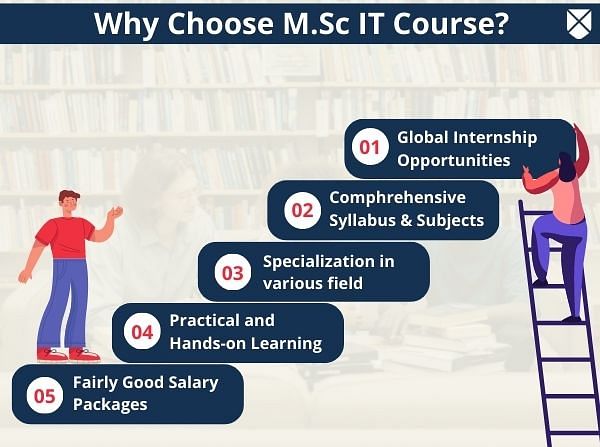
What is an M.Sc IT Course All About?
M.Sc IT is a professional course that deals with the study of software handling and understanding the implementation of electronics and microelectronics and their application in the IT sector. The aspiring candidates can study real-time projects which are solely client based which also allows the application of software like Java and Hadoop.
Popular and renowned IT firms like TCS and Accenture have great opportunities for graduates with a degree in Master of Science [M.Sc, IT] (Information Technology).
What Do M.Sc IT Professionals Do?
M.Sc IT professionals can have successful careers as software developers, senior software engineers, data scientists and analysts. These graduates work in the field of information technology and computer science both in the IT sector and as well as other sectors or industries where IT support is needed.
Reason Why M.Sc IT Can Fetch You A Rewarding Career?
Check out the reasons below to understand why is M.Sc IT a rewarding career choice for IT professionals:
- Job opportunities: Post the completion of the M.Sc IT course graduates may opt for several job roles such as Software Developer, IT analyst, Maintenance Engineer, Application programmer, etc in top MNCs.
- Higher Demand: The IT sector is only growing at a tremendous rate and is further expected to grow at a 15% to 20% rate in the following years. Thus, creating greater demand for IT professionals with technical knowledge.
- Greater Salary: Due to various options and various roles of choice, one can get a decent salary after the completion of the course. The median M.Sc IT salary lies around 3 LPA but it can go as high as 15 LPA.
- Entrepreneurship: Many graduates wish to become an entrepreneur after completing their degree, and post the M.Sc IT program they'll gain better insights on what, when and how to do it.
Read More: M.Sc IT Job Opportunities and Scope
M.Sc IT Preparation Tips
In order to crack the entrance exam for M.Sc IT admission, one should prepare effectively for it both while pursuing their bachelors and as well as while preparing for the M.Sc IT entrance exam. Following are some of the important tips that every aspirant should know:
- In-depth study of the syllabus: Begin with scrutinization of the syllabus. An aspirant should make a proper list of the topics required to be covered additionally and should lay primary focus on the same.
- Jot down the focus points: While scrutinising the syllabus, understand your own weak points and lay special emphasis on the same while preparing. Maintain composure and study ethics.
- Set a balanced routine: Building a self-made timetable and adhering to it is mandatory as it sets the candidate a target to attain each day or week.
- Practice previous year question papers: It gives the aspirant an idea of the type of paper pattern and the level of difficulty while allowing the aspirant hands-on practice and experience.
- Mental stability: It is crucial to strike a balance. Take time to relax your mind and rest. This will help you speed up the preparation.
Scope After M.Sc IT
M.Sc IT graduates who are planning to pursue higher education also have tremendous opportunities. M.Sc IT scope allows candidates to pursue an MPhil or a PhD in IT and related fields. If the candidate is looking to upgrade to managerial positions, they can study MBA Information Technology.
Career Options For M.Sc IT
After completing M.Sc IT, graduates can look for jobs in various sectors or they may opt for higher education. Professionals with an M.Sc IT can choose to work in one of the following,
- Software Developer
- IT analyst
- Maintenance Engineer
- Application programmer
M.Sc IT graduates also have an option of pursuing their careers in other industries like teaching, banking and analytics. Graduates may also apply for vacancies in the government sector as well. Also, some of the top recruiters are as follows,
- TCS
- Infosys
- IBM
- Accenture
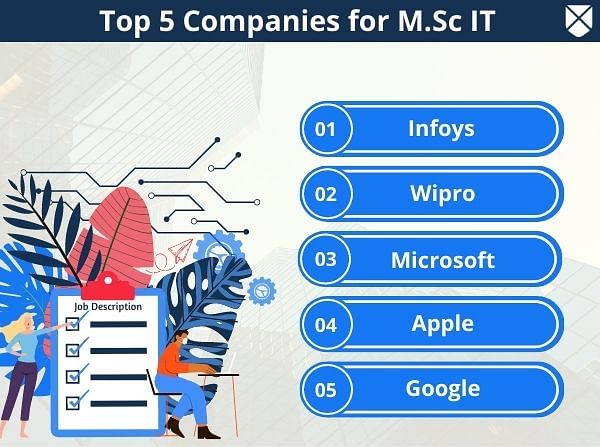
M.Sc IT Salary
The M.Sc IT salary ranges from 3 LPA to 5 LPA [Source: Glassdoor] and gradually increases with the years of experience. Another factor that influences the M.Sc IT salary is the job profile that the professionals are opting for.
Read More: M.Sc Salary
Skills That Make You Best M.Sc IT
Following are a few skills that can help me become the best at M.Sc IT and as well as help in become an excellent IT professional.
- Technical Understanding: To be the best at being an IT professional, the graduates must have a detailed understanding of technical aspects of information technology and coding.
- Logical Thinking: As an IT professional, logical thinking is one of the skills that must be excelled. As every code works on the basis of codes.
- Clarity of Concepts: Unless the basics are not clear, one cannot excel in other skills moving forward. Hence, it is very important to have clarity of concepts.
- Analytical Skills: Developing analytical skills will help in understanding every problem better and hence help in solving them easily.
